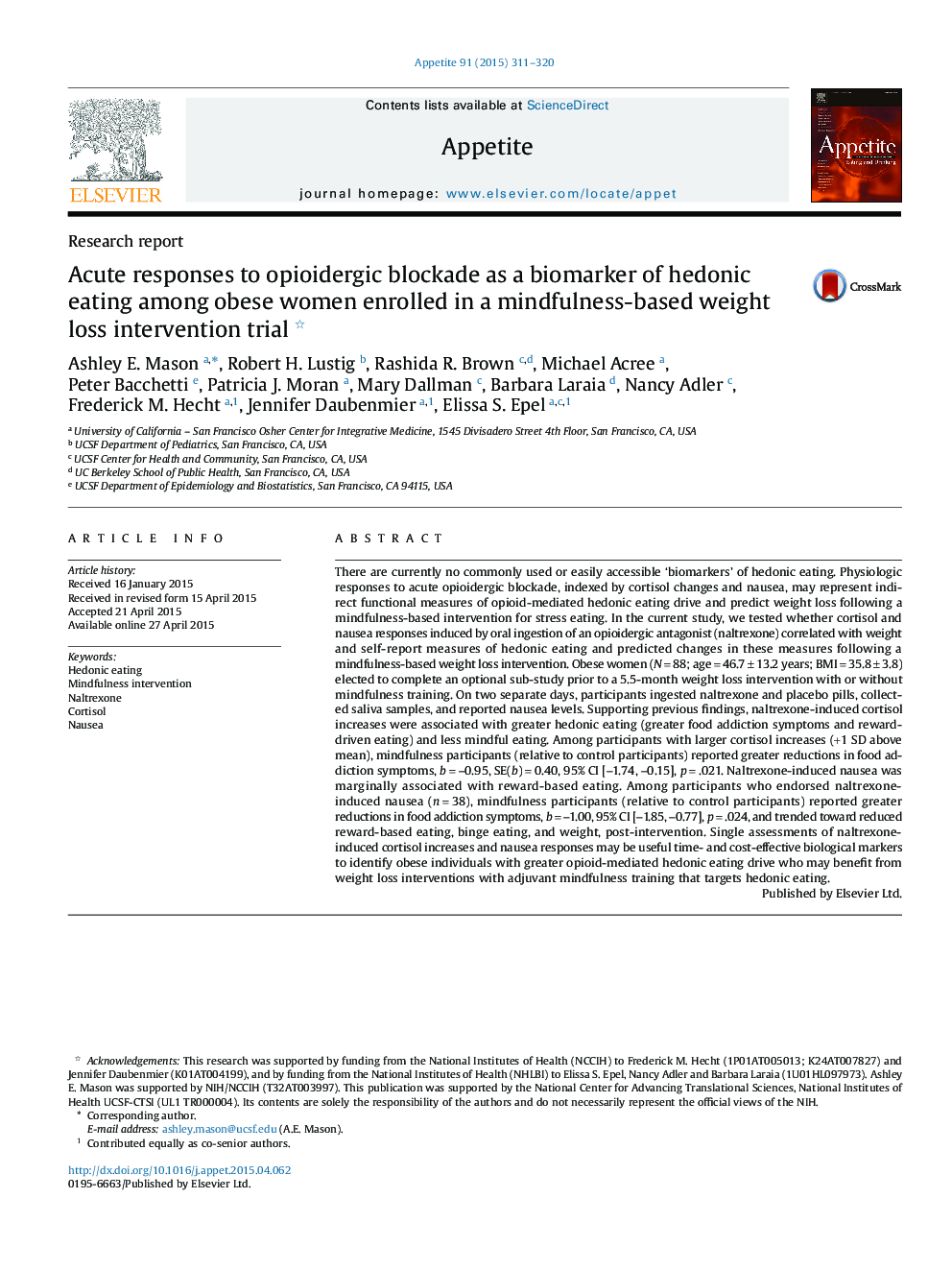| کد مقاله | کد نشریه | سال انتشار | مقاله انگلیسی | نسخه تمام متن |
|---|---|---|---|---|
| 7308822 | 1475389 | 2015 | 10 صفحه PDF | دانلود رایگان |
عنوان انگلیسی مقاله ISI
Acute responses to opioidergic blockade as a biomarker of hedonic eating among obese women enrolled in a mindfulness-based weight loss intervention trial
دانلود مقاله + سفارش ترجمه
دانلود مقاله ISI انگلیسی
رایگان برای ایرانیان
موضوعات مرتبط
علوم زیستی و بیوفناوری
علوم کشاورزی و بیولوژیک
دانش تغذیه
پیش نمایش صفحه اول مقاله

چکیده انگلیسی
There are currently no commonly used or easily accessible 'biomarkers' of hedonic eating. Physiologic responses to acute opioidergic blockade, indexed by cortisol changes and nausea, may represent indirect functional measures of opioid-mediated hedonic eating drive and predict weight loss following a mindfulness-based intervention for stress eating. In the current study, we tested whether cortisol and nausea responses induced by oral ingestion of an opioidergic antagonist (naltrexone) correlated with weight and self-report measures of hedonic eating and predicted changes in these measures following a mindfulness-based weight loss intervention. Obese women (Nâ=â88; ageâ=â46.7â±â13.2 years; BMIâ=â35.8â±â3.8) elected to complete an optional sub-study prior to a 5.5-month weight loss intervention with or without mindfulness training. On two separate days, participants ingested naltrexone and placebo pills, collected saliva samples, and reported nausea levels. Supporting previous findings, naltrexone-induced cortisol increases were associated with greater hedonic eating (greater food addiction symptoms and reward-driven eating) and less mindful eating. Among participants with larger cortisol increases (+1 SD above mean), mindfulness participants (relative to control participants) reported greater reductions in food addiction symptoms, bâ=ââ0.95, SE(b)â=â0.40, 95% CI [â1.74, â0.15], pâ=â.021. Naltrexone-induced nausea was marginally associated with reward-based eating. Among participants who endorsed naltrexone-induced nausea (nâ=â38), mindfulness participants (relative to control participants) reported greater reductions in food addiction symptoms, bâ=ââ1.00, 95% CI [â1.85, â0.77], pâ=â.024, and trended toward reduced reward-based eating, binge eating, and weight, post-intervention. Single assessments of naltrexone-induced cortisol increases and nausea responses may be useful time- and cost-effective biological markers to identify obese individuals with greater opioid-mediated hedonic eating drive who may benefit from weight loss interventions with adjuvant mindfulness training that targets hedonic eating.
ناشر
Database: Elsevier - ScienceDirect (ساینس دایرکت)
Journal: Appetite - Volume 91, 1 August 2015, Pages 311-320
Journal: Appetite - Volume 91, 1 August 2015, Pages 311-320
نویسندگان
Ashley E. Mason, Robert H. Lustig, Rashida R. Brown, Michael Acree, Peter Bacchetti, Patricia J. Moran, Mary Dallman, Barbara Laraia, Nancy Adler, Frederick M. Hecht, Jennifer Daubenmier, Elissa S. Epel,